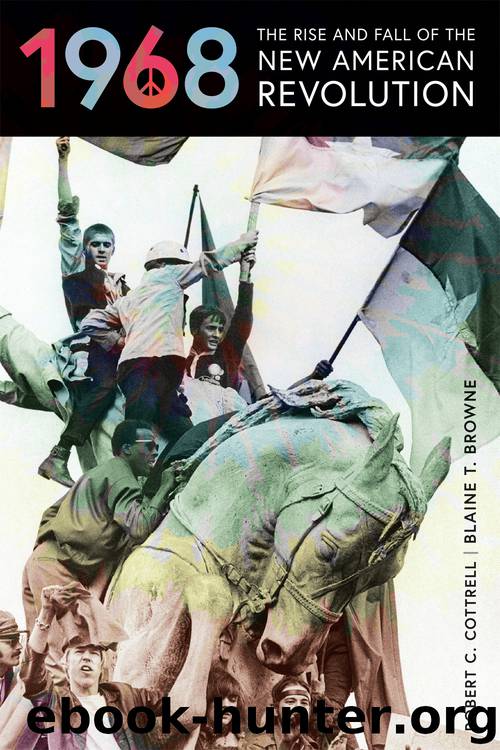1968 by Robert C. Cottrell & Blaine T. Browne

Author:Robert C. Cottrell & Blaine T. Browne
Language: eng
Format: epub
ISBN: 9781538107768
Publisher: Rowman & Littlefield Publishers
Published: 2018-04-15T04:00:00+00:00
8
“You Say You Want a Revolution”
Radical Politics and the Counterculture
During the summer of 1968, the American counterculture increasingly grappled with the possibility of revolution. Appropriately enough, discussion of wholesale social and political transformation, as exemplified by the invoking of revolutionary theoreticians or street fighting, cropped up in songs by leading rock musicians. John Lennon, long viewed as the most intellectually inclined member of the Beatles, penned “Revolution,” the different versions of which seemed an attempt to dissuade others from going down such a path or at least that of a violent variety. To some at least, the Rolling Stones’ Mick Jagger and Keith Richards appeared more in tune with changing political sensibilities on the political left, singing about the need to be “a street fighting man.”
In the original version of “Revolution,” recorded in early July at Apple Studios, located at 94 Baker Street in Marylebone, London, Lennon spoke to those who favored revolution: a growing number of young people and others associated with various aspects of the Movement and the counterculture. He gently responded that “We all”—clearly referring to political activists and socially conscious hippies—desired to “change the world.” Like those who believed this was the natural course of events, Lennon again also conveyed support for social, political, and cultural transformation. But he refused to go along with those who opted for violence, suggesting instead that everything would work out, eventually. He also questioned individuals with a specific goal in mind, and he expressed a desire “to see the plan.” Regarding the providing of financial support for the cause, Lennon indicated that he and his ilk were already offering what they could but refused to assist those “with minds that hate.” Even the notion of constitutional or institutional change he found questionable, declaring it was necessary to alter people’s heads and free their minds instead. As for those heading down the path that a number of young people were, whether in Paris or the United States, expressing belief in Maoism, they “ain’t gonna make it with anyone, anyhow,” Lennon warned.
Download
This site does not store any files on its server. We only index and link to content provided by other sites. Please contact the content providers to delete copyright contents if any and email us, we'll remove relevant links or contents immediately.
| Africa | Americas |
| Arctic & Antarctica | Asia |
| Australia & Oceania | Europe |
| Middle East | Russia |
| United States | World |
| Ancient Civilizations | Military |
| Historical Study & Educational Resources |
Cat's cradle by Kurt Vonnegut(15333)
Pimp by Iceberg Slim(14481)
4 3 2 1: A Novel by Paul Auster(12371)
Underground: A Human History of the Worlds Beneath Our Feet by Will Hunt(12085)
The Radium Girls by Kate Moore(12014)
Wiseguy by Nicholas Pileggi(5769)
The Fire Next Time by James Baldwin(5431)
Perfect Rhythm by Jae(5396)
American History Stories, Volume III (Yesterday's Classics) by Pratt Mara L(5298)
Paper Towns by Green John(5177)
Pale Blue Dot by Carl Sagan(4996)
A Higher Loyalty: Truth, Lies, and Leadership by James Comey(4950)
The Mayflower and the Pilgrims' New World by Nathaniel Philbrick(4487)
The Doomsday Machine by Daniel Ellsberg(4484)
Killers of the Flower Moon: The Osage Murders and the Birth of the FBI by David Grann(4435)
The Sympathizer by Viet Thanh Nguyen(4384)
Too Much and Not the Mood by Durga Chew-Bose(4337)
The Borden Murders by Sarah Miller(4312)
Sticky Fingers by Joe Hagan(4188)
